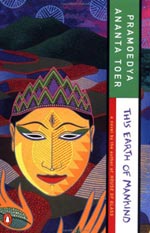
“We are walking to hell, toward a very dark future”
A few days ago I picked up a copy of Pramoedya Ananta Toer’s “This Earth of Mankind,” the first novel of his acclaimed Buru Quartet. Pramoedya, who died in 2006, was widely considered one of Indonesia’s finest 20th century writers, and the many years he spent imprisoned in that country (by both its colonial Dutch masters and later Indonesian governments) made him, in some circles, an iconic dissident and exemplar of the writer-as-conscience-of-the-nation model. He won the PEN Freedom to Write Award and the Ramon Magsaysay Award, which cited “his illuminating with brilliant stories the historical awakening and modern experience of the Indonesian people.”

Prisoners on Buru island were denied any reading materials. In his afterword, Max Lane, an official at the Australian Embassy in Indonesia who was recalled home after translating the book into English, writes of a prisoner who found a small, ragged scrap of newspaper and was later discovered with it by guards. The guards killed the prisoner and tossed him in a river. It was in this environment that Pramoedya’s stories were orally transmitted, first from the author himself, then between prisoners. ”This Earth of Mankind,” along with Pramoedya’s other writings, were banned for many years in Indonesia, but not before a publishing house run by ex-political prisoners made the novel a bestseller.
In the US, we have little tradition of verboten texts wielding such power, no history of samizdat furtively shared among whispering dissidents, although slaves in the pre-Civil War era often communicated surreptitiously, sustaining each other through song. We should probably be grateful, since this lack reflects our nation’s generally liberal policies of freedom of expression, though certainly we owe debts to people like Barney Rosset, who fought American censorship laws and published controversial works like “Tropic of Cancer” and “Lady Chatterley’s Lover.” But if we gain something by this freedom, obviating over-romanticized notions of the tyrant-challenging samizdat, then I think we lose something, too. For in this country we, unfortunately, have little room for the role plumbed by Pramoedya, Solzhenitsyn, and others of the writer speaking truth to power. Little attention is paid to, say, Philip Roth criticizing George W. Bush (though certainly he is one of a crowd in that regard) or the commendable Cities of Refuge program. Sure, the States once had a fine intersection of poetry and political activism, fading in the 70s along with the Beats who made it great and the general enthusiasm for protest. Instead we must look abroad to dictatorships like Burma, where poets are imprisoned for writing verses on Valentine’s Day, or to our more democratic friends across the sea in England, where the views of the likes of Martin Amis and Harold Pinter receive significant media attention, for better or worse.
On December 1, The Los Angeles Times ran a compelling piece on Iman Bakry, an Egyptian poet who is allowed relative freedom of expression. It is a line from Bakry, uttered in an interview, that provides the title to this blog entry, and it could be taken as representative of her views of Hosni Mubarak’s 27-year rule of Egypt. The Times piece describes Bakri as a nationally prominent poet in her country who deftly criticizes the regime in poetry—one poem is titled “Hello, Our Masters”—and in media appearances. But by Bakry’s own admission, while her audience has grown, “as far as the government is concerned, neither [she] nor any other poet has much of an impact.”
Egyptians “are living as if in a theatrical play,” Bakry says, where, as in one of her poems, “Democracy is our ruse.” Let us hope that she and others persevere, following in the great tradition of Pramoedya and of Middle Eastern writers like Mahmoud Darwish, Adunis, Amos Oz, Naguib Mahfouz, and David Grossman, who, in their varying ways, challenge and chronicle the consciences of their nations. With luck, her works will outlast the tyrants’, as Pramoedya’s surely have.
